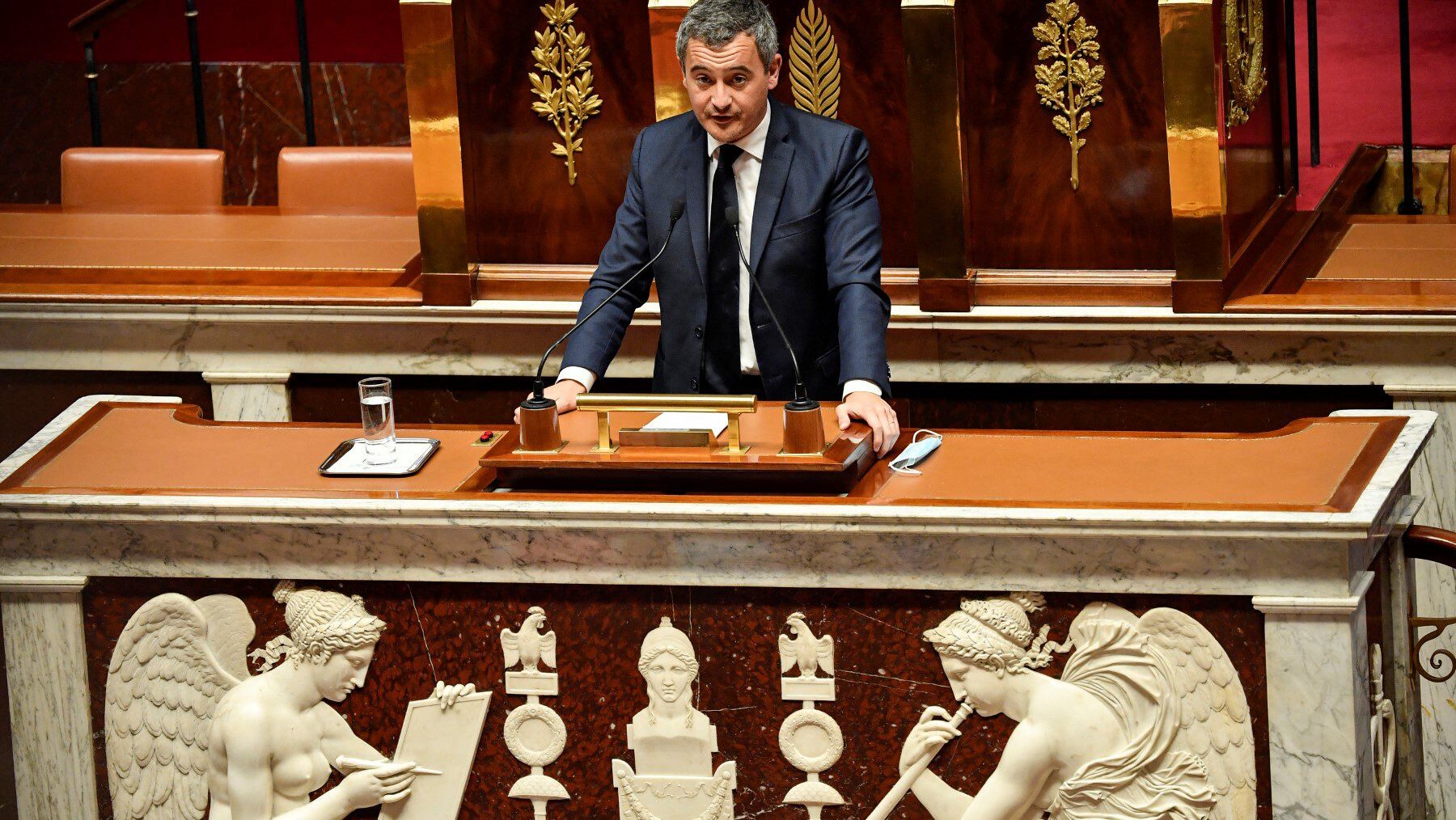
French Interior Minister Gérald Darmanin makes a statement on immigration policy at the National Assembly in Paris on December 6, 2022.
Photo: JULIEN DE ROSA / AFP
The French draft law on immigration reform was temporarily withdrawn on Monday, December 11th, after a Green Party motion to reject the bill was adopted by a majority of MPs.
The immigration law has attracted widespread opposition from both Left and Right. As a result of the vote, disavowed Interior Minister Gérald Darmanin tendered his resignation to President Emmanuel Macron, who rejected it.
The bill to reform France’s migration policy has been under consideration for many months. Its passage through the Senate led to a major rewrite of the text at the initiative of the right-wing Les Républicains party, which has a majority in the upper house. They made a number of changes aimed at tightening France’s reception policy. The bill was then returned to be examined by the National Assembly. In the preparatory committees, it was considerably reworked, and the members of the government majority did not keep the changes sought by Les Républicains, ultimately proposing a much more lax version. The resulting version was seen as too lax in the eyes of the Right, but still too severe in the eyes of the Left, and the bill was unanimously opposed.
The ecologists of the Green Party therefore filed a motion for prior rejection, a procedure that, if the motion is adopted, leads to the withdrawal of a legislative text without examination. An unprecedented coalition of opposition came together to pass the motion for rejection late on Monday, December 11th: the votes of the Right, the LR party and the Rassemblement National joined with those of the Left to defeat the government camp. 270 MPs voted in favour of the rejection, while 265 voted against.
“Your government has allowed the Senate’s firm text to be trampled underfoot in committee,” Olivier Marleix, leader of the LR group, told Darmanin. Marleix is now calling for a return to the version of the text adopted by the Senate. Marine Le Pen, leader of the Rassemblement National parliamentary group, was “delighted” by the rejection vote: “We have protected the French people from a migratory tidal wave,” she explained in the Assembly corridors, as the proposed law “provided for the creation of one of the biggest immigration channels since family reunification.” The Rassemblement National intends to propose a new bill to thwart the government’s plan. Les Républicains party leader Eric Ciotti reiterated his call for constitutional reform on the subject of immigration.
The Left was pleased to have sent the executive a very strong signal of Parliament’s independence. “Darmanin has tamed the Macronist groupuscules. But not the National Assembly,” congratulated Jean-Luc Mélenchon on X.
Taking note of this stinging rejection of a reform that he wanted, and to which he was personally committed, Gérald Darmanin therefore offered his resignation to Emmanuel Macron, who refused it.
The coalition of opposition makes it difficult to interpret the vote since the motivation for the rejection of the text is not at all the same for the Green Party ecologists, the Republicans, and the Rassemblement National. La France Insoumise MP Mathilde Panot is delighted to have “spared the country two weeks of xenophobic and racist debates,” while RN MP Sébastien Chenu explains that the vote was “consistent with all our voters who are asking us to oppose these lax policies.” The humorist Xavier Gorce, cartoonist for the weekly Le Point, made this contradiction the subject of his cartoon the day after the vote:
Union de rejet
— Xavier Gorce (@XavierGorce) December 12, 2023
In newsletter @LePoint du 12-12-2023https://t.co/AkEUX1AN7e pic.twitter.com/FEtxxztNUS
Gérald Darmanin took offence at this rejection, claiming that the majority of French people were in favour of the text and had been betrayed by their MPs, which is not entirely true, since opinion polls suggest that the French are in favour of a tougher law than the government’s plan and of strict control over immigration.
The most obvious interpretation is that of a general rejection of Emmanuel Macron’s policy: the “at the same time” (en même temps) approach on an issue as sensitive as immigration cannot work. Darmanin tried to defend a “ridge line,” as he put it, which ultimately convinced no one. It is impossible to attempt to reconcile firmness and flexibility, or else the effects will be the opposite of what was intended.
L’adoption de la motion de rejet traduit l’échec du en même temps et sanctionne l’immobilisme et l’impuissance.
— Eric Ciotti (@ECiotti) December 12, 2023
Le texte du ministre de l’Intérieur en est la traduction.
Sous des airs de fermeté, il aurait entraîné la régularisation de l’immigration clandestine ! pic.twitter.com/WY7D53lXYD
In the words of Gérald Darmanin, who was a guest on the TF1 evening news on the day the motion to reject the bill was adopted, the text “must continue its institutional path.” There are several possible solutions: either the text can be terminated, the Senate version can be reintroduced, or it can go straight to the next stage, i.e., the joint committee, a select committee designed to reach a compromise text between the Senators and the MPs. For the moment, the government has not yet decided which route to take.
